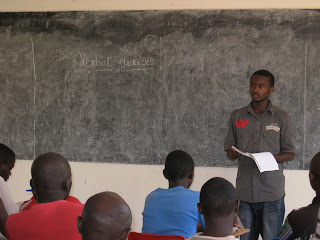Recently I started a new project helping students from Senior 5 partake
in Tikkun Olam (repairing the world). At Agahozo, students in the first year
focus on Tikkun HaLev (repairing the heart). When the enter Senior 4, they
partake in Tikkun Olam every Tuesday of all terms. They go to Rubona and help
with various projects: working in the clinic, teaching in the Primary School
and building houses for poor people. In Senior 5, students begin Tikkun Olam in
Term 2. Every Thursday they help in different projects: teaching English and
educating about computers.
The specific project that I am focused on is helping to teach English to
people living in the areas surrounding Agahozo Shalom. The group of local
students is made up of around 20 people ranging in ages from 18 to 45 years
old. The local students range in completion of Primary 4 up to Senior 6
(Primary = Middle School, Secondary = High School). Despite the differences in
age and educational background, all of the local students are eager to learn
English.
 |
| Intermediate class. |
Not knowing what to expect, I was blown away! While I didn’t know many
of the Senior 5 students, I was so proud of them. They came into Tikkun Olam
also not knowing what to expect and with no lesson plan. Fluidly and
effortlessly the Senior 5 students worked together to teach the local students
greetings and the alphabet. The focus was to test them in order to split the
local students into 2 levels, beginners and intermediate.
Throughout the lesson I couldn’t stop myself from smiling. I was so
impressed with the Senior 5 students. One of the most enjoyable parts of the
examination was when one student, Chloe, taught the local students the
alphabet. After reviewing each letter, Chloe taught them the ABC song (to a
different tune than I’m used to, but a really catchy one). With great fervor,
the local students sang the song. As they repeated the song, the local students
began to smile and sing louder, with more confidence. As more confidence filled
the room, the Senior 5 students began to feel more comfortable in their roles
as English educators. After the exercise, one of the local students pointed out
that the word “Alphabet” was spelled incorrectly on the board. All of the
Senior 5 students shared a chuckle as no one had noticed it until one of the
local students pointed it out.
While some Senior 5 students proceeded with the examination, I sat with
Patrick, the Senior 5 student that helped me teach English to the Enrichment
Year students in one of the first weeks of my being in ASYV. Curious about why
so many local students had not been taught English prior, he taught me many
things about the education system in Rwanda:
- Before Genocide all Primary and Secondary schooling required school fees. Due to poverty, many people could not afford the school fees.
- After Genocide, many students stopped attending school because of other responsibilities.
- People that were child-head of household often cannot attend school since they have to care for their younger siblings.
- Currently, Primary 1 to Senior 3 is free. School fees are only required for Senior 4 – Senior 6. This allows more students to successfully learn.
 |
| Peace and Patrick teaching a lesson. |
It was such a privilege to be with Patrick 5 months after
first meeting him. I watched him blossom over time and now be more confident in
his ability to share his strong knowledge of English. (He’s the student that
really wants to create another youth village in Africa with me.)
After the examination was completed, the Senior 5 students split the
class. I joined the intermediate class to be a resource for English grammar and
spelling. The first thing we did when we split into two groups was practice
greetings. Through the exercise, it was very clear that one of the local
students was a low-level listener and speaker. Two of the Senior 5 students
approached me to get advice on how to handle the situation. While I didn’t play
an active role in creating and executing the lesson plan, it was really nice to
be able to provide advice.
 |
| Yves and a local student laughing during the lesson. |
The lesson exceeded the end time since both the Senior 5 and local
students were eager to continue learning. By the end of the lesson, the local
students were asking for English translations of various words and sentences.
Among the words, “stomach” and “chin” was “My lover, I want to hug you.” The Senior
5 students got a laugh out of that one. After the lesson, I walked back to my
house with two Senior 5 students that had taught. They asked me all about the
education system in America. It was such an educational and interesting
conversation.
I was so impressed with the performance of both the local and Senior 5
students. It is incredible that the Senior 5 students are able to bring so much
energy and passion into teaching English despite their other pressures of
school and extracurricular studies. Each Senior 5 student took part in teaching
and assisting the local students, and did so with extreme care and commitment.
Now that’s what I call Tikkun Olam!
 |
| Blaise teaching greetings. |
 |
| A Senior 5 student helping a local student. It's almost as if they planned their outfits. |























